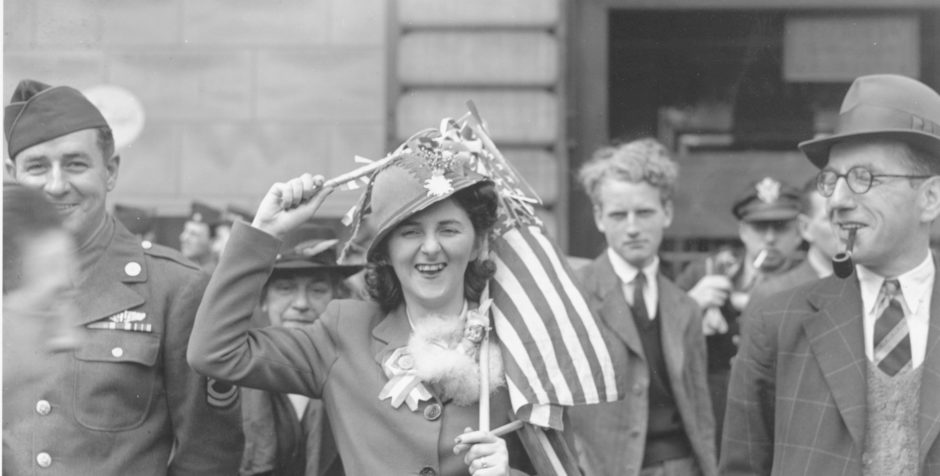Defeating Nazi Germany: Lessons 75 Years Later
In light of the COVID-19 pandemic and everything else going on in the world today, the fact that today is the 75th anniversary of V-E Day—the Allied defeat of Germany in World War II—will not receive the level of attention that it otherwise would have. There are many important lessons that today’s Americans can learn from the sacrifices made by our Greatest Generation, however, and these lessons can help us to better combat the challenges we face today.
Although World War II began in 1939 with the German invasion of Poland, it was not until December 7, 1941—“a date which will live in infamy”—that the war hit American soil with the Japanese attack on Pearl Harbor. From that day forward, Americans of all walks of life, religious and political beliefs, and social classes banded together with a singular focus: defeat a powerful threat that was responsible for unfathomable destruction of human life.
Over the next 3 years and 9 months, Americans made tremendous sacrifices for the greater good of the country. During the war, enlistment in the military skyrocketed to 16 million, which was over 10% of the American population at the time. Over 400,000 of these brave individuals lost their lives during the war, along with 70-85 million others around the world.
Those who remained on the home front also did their part to support the war effort. There were broad changes to the labor market, supplies were rationed to ensure that those on the front lines could be as well-equipped as possible, and numerous civilian-staffed volunteer organizations helped support the cause in a variety of ways. All told, the country spent an incredible 36% of its GDP—over $4 trillion—on the war effort.
It would be inaccurate to claim that literally all Americans were unified during the war, or to claim that everything done or said in support of the war effort was wise, morally justified, or laudable. To the contrary, during the war, there were vociferous dissenters, controversies, some riots, and gross mistreatment of some Americans due to their race or ancestry, among other things. But, perhaps more than any other time in our history, Americans, on the whole, put their differences aside to make sacrifices for the greater good and find common ground to fight a common threat.
There are some clear parallels to the challenges that America faced in the early 1940s and the threat that we face today. We have front-line nurses, doctors, and other health care and essential workers putting their lives and health on the line every day to help others. Many Americans have volunteered to help in a variety of ways, from making personal protective equipment for front-line workers to helping provide food and supplies to those who need them. In some ways, the crisis has brought Americans together to fight a common enemy.
In other ways, however, the pandemic has served as a catalyst to further fracture our society along political, economic, and social lines. It seems that almost every discussion of the pandemic, what our government has done or should do about it, and its impact on Americans’ lives quickly devolves into a polarizing “us versus them” argument. It is understandable that the fear and devastation brought on by the pandemic would generate some emotional vitriol, but apparently lost in all the finger-pointing is the fact that the enemy is COVID-19, not our fellow Americans.
The absurdity has gone so far that even the offering of prayers for those impacted the most by the pandemic has come under attack. The history of this nation shows that the ability to come together in a time of crisis, despite our differences, is one of America’s greatest strengths, and invoking divine providence and guidance with respect to our endeavors has a rich tradition. For instance, in 1789, George Washington declared the Thanksgiving holiday in light of the assistance that God provided to Americans during and after the Revolutionary War.
Especially relevant on the anniversary of V-E Day, General Dwight D. Eisenhower’s D-Day statement to those who were about to storm the beaches of Normandy (in the largest amphibious invasion in the history of warfare) concluded with the following statement: “Good luck! And let us all beseech the blessing of Almighty God upon this great and noble undertaking.”
Today, as ceremonies commemorating the 75th Anniversary of V-E Day have been postponed or held online due to COVID-19, we should consider the lessons of the past as we deal with the challenges of the present. Our money bears the phrase “e pluribus unum,” meaning “out of many, one,” and today would be a fitting time to honor the principle that we are one unified nation despite our many differences.
Abraham Lincoln, borrowing from the Bible, famously declared that “[a] house divided against itself cannot stand.” That principle should guide our public discourse and responsive action concerning the war against COVID-19 just as it helped to guide the Allies to victory.
